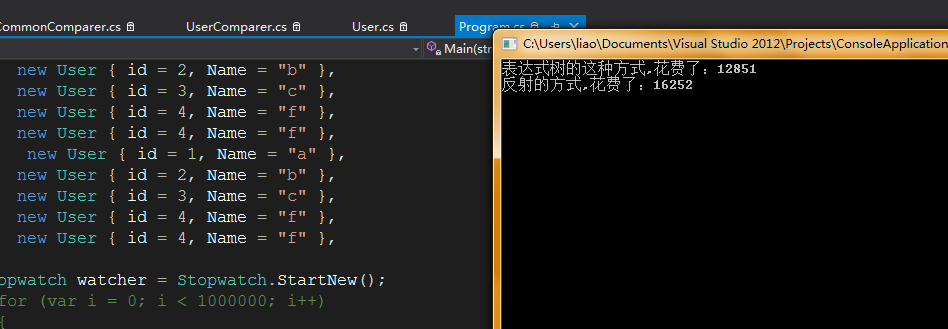使用Linq过滤重复对象的时候,我们使用Distinct。
但是Distinct对int long等值类型才有效果,对于对象我们需要自己写个对象。
以下利用泛型封装了两个类:
CommonComparer<T>
public class CommonComparer<T> : IEqualityComparer<T>
{
Func<T, string> GetStrigPropertyValueFunc;
Func<T, int> GetInt32PropertyValueFunc;
Func<T, long> GetInt64PropertyValueFunc;
public CommonComparer(string propertyName)
{
var tType = typeof(T);
PropertyInfo propertyInfo = tType.GetProperty(propertyName);
ParameterExpression pExpress = Expression.Parameter(tType);
MemberExpression bodyExpress = Expression.Property(pExpress, propertyInfo);
switch (propertyInfo.PropertyType.Name)
{
case "Int32":
GetInt32PropertyValueFunc = Expression.Lambda<Func<T, int>>(bodyExpress, pExpress).Compile();
break;
case "Int64":
GetInt64PropertyValueFunc = Expression.Lambda<Func<T, long>>(bodyExpress, pExpress).Compile();
break;
case "String":
GetStrigPropertyValueFunc = Expression.Lambda<Func<T, string>>(bodyExpress, pExpress).Compile();
break;
default: throw new NotSupportedException("对比器只支持int32、int64、String");
}
}
public bool Equals(T x, T y)
{
if (GetStrigPropertyValueFunc != null)
{
var xValue = GetStrigPropertyValueFunc(x);
var yValue = GetStrigPropertyValueFunc(y);
if (xValue == null) return yValue == null;
return xValue.Equals(yValue);
}
else if (GetInt32PropertyValueFunc != null)
{
var xValue = GetInt32PropertyValueFunc(x);
var yValue = GetInt32PropertyValueFunc(y);
if (xValue == null) return yValue == null;
return xValue.Equals(yValue);
}
else if (GetInt64PropertyValueFunc != null)
{
var xValue = GetInt64PropertyValueFunc(x);
var yValue = GetInt64PropertyValueFunc(y);
if (xValue == null) return yValue == null;
return xValue.Equals(yValue);
}
throw new NotSupportedException("没找到支持的委托类型");
}
public int GetHashCode(T obj)
{
if (GetStrigPropertyValueFunc != null)
{
var value = GetStrigPropertyValueFunc(obj);
if (obj == null) return 0;
return value.GetHashCode();
}
else if (GetInt32PropertyValueFunc != null)
{
var value = GetInt32PropertyValueFunc(obj);
if (obj == null) return 0;
return value.GetHashCode();
}
else if (GetInt64PropertyValueFunc != null)
{
var value = GetInt64PropertyValueFunc(obj);
if (obj == null) return 0;
return value.GetHashCode();
}
return 0;
}
}
ReflectCommonComparer<T>
public class ReflectCommonComparer<T> : IEqualityComparer<T>
{
string PropertyName;
public ReflectCommonComparer(string propertyName)
{
PropertyName = propertyName;
}
object GetPropertyValue(T x)
{
PropertyInfo propertyInfo = typeof(T).GetProperty(PropertyName);
return propertyInfo.GetValue(x);
}
public bool Equals(T x, T y)
{
var xValue = GetPropertyValue(x);
var yValue = GetPropertyValue(y);
if (xValue == null) return yValue == null;
return xValue.Equals(yValue);
}
public int GetHashCode(T obj)
{
var value = GetPropertyValue(obj);
if (obj == null) return 0;
return value.GetHashCode();
}
}
CommonComparer利用的是表达式树来实现的,ReflectCommonComparer是利用反射来实现的。网络上说利用的是表达式树来实现比反射更快。
我做了简单的时间测试,以下是截图:

1000次循环对比,反射更快呀

十万次对比,也是反射的比较快呀。
有可能是我写的表达式树有问题。 有空再去试试。
---
我把去重的数据量变多了之后的对比:

十万次,表达式树更快了。
我的结论是,去重的数据量多的话就用表达式树,少的话就用反射。大概超过80就需要用表达式树了。
因此以上还可以进一步分装。
public static class LinqExtension
{
public static IEnumerable<T> Distinct<T>(this IEnumerable<T> source, string propertyName)
{
if (source.Count() > 80)
return source.Distinct(new CommonComparer<T>(propertyName));
else
return source.Distinct(new ReflectCommonComparer<T>(propertyName));
}
}
使用
var newList = list.Distinct("id").ToList(); // id是要用来判断去重的唯一值